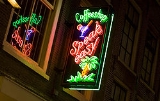
Cannabis coffee shop
Encyclopedia
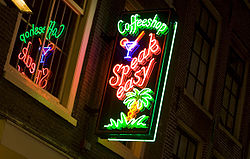
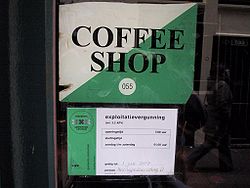
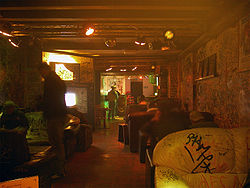
Under the drug policy of the Netherlands
Drug policy of the Netherlands
The drug policy of the Netherlands officially has four major objectives:# To prevent recreational drug use and to treat and rehabilitate recreational drug users.# To reduce harm to users....
, the sale of cannabis products in small quantities is allowed by 'licensed' coffee shops. The majority of these "coffeeshops" (in Dutch written as one word) also serve drinks and food. Coffeeshops are not allowed to serve alcohol (although in the past some coffeeshops in central Amsterdam have transgressed this law without reproach) or other drugs, and risk closure if they are found to be selling soft drugs to minors, hard drugs or selling alcohol without a license. The idea of coffeeshops was introduced in the 1970s for the explicit purpose of keeping hard and soft drugs separated.
In the Netherlands, 105 of the 443 municipalities have at least one coffeeshop. Many at the borders sell mostly to foreigners (mostly from Belgium
Belgium
Belgium , officially the Kingdom of Belgium, is a federal state in Western Europe. It is a founding member of the European Union and hosts the EU's headquarters, and those of several other major international organisations such as NATO.Belgium is also a member of, or affiliated to, many...
, Germany
Germany
Germany , officially the Federal Republic of Germany , is a federal parliamentary republic in Europe. The country consists of 16 states while the capital and largest city is Berlin. Germany covers an area of 357,021 km2 and has a largely temperate seasonal climate...
and France
France
The French Republic , The French Republic , The French Republic , (commonly known as France , is a unitary semi-presidential republic in Western Europe with several overseas territories and islands located on other continents and in the Indian, Pacific, and Atlantic oceans. Metropolitan France...
), who can also buy marijuana in their own countries, but prefer the legality and higher product quality of Dutch coffeeshops.
The Dutch government announced in October 2011 that coffee shops will be banned from selling “strong” cannabis, in which the active ingredient THC
THC
THC commonly refers to tetrahydrocannabinol, the main active chemical compound in Cannabis.THC may also refer to:* Tan Holdings Corporation...
is higher than 15 percent.
Dutch coffee houses not serving marijuana are called koffiehuis (literally "coffee house"), while a café is the equivalent of a bar
Bar (establishment)
A bar is a business establishment that serves alcoholic drinks — beer, wine, liquor, and cocktails — for consumption on the premises.Bars provide stools or chairs that are placed at tables or counters for their patrons. Some bars have entertainment on a stage, such as a live band, comedians, go-go...
.
Coffee shop law
In the Netherlands, the selling of cannabis is "illegal, but not punishable", so the law is not enforced in establishments following these nationwide rules:- no advertising
- no hard drug sales on the premises
- no sales to anyone under the age of 18
- no sales transactions exceeding 5 grams
- no public disturbances
For some offenses, a business may be forced to close for three to six months, for others, completely; all this is detailed in official policies.
Coffeeshops are no longer allowed to sell alcohol. Most coffee shops advertise, and the constraint is more moderating than outright prohibitive. In a gesture of discretion still technically required, many coffee shops keep the cannabis menu below the counter, even when the cannabis itself is in more-or-less plain view. Dutch coffee shops often fly red-yellow-green Ethiopian flags
Flag of Ethiopia
The flag of Ethiopia is a flag that was adopted on February 6, 1996. It conforms to the specifications set forth in article 3 of the 1995 Constitution of Ethiopia. The three traditional colours date back to Emperor Menelik and were first used in a flag in 1897...
, other symbols of the Rastafari movement
Rastafari movement
The Rastafari movement or Rasta is a new religious movement that arose in the 1930s in Jamaica, which at the time was a country with a predominantly Christian culture where 98% of the people were the black descendants of slaves. Its adherents worship Haile Selassie I, Emperor of Ethiopia , as God...
, or depiction of palm leaves to indicate that they sell cannabis, as a consequence of the official ban on direct advertising. This aesthetic attracted many public artists who get commissions to create murals in the coffee shops and use the Rastafari and reggae
Reggae
Reggae is a music genre first developed in Jamaica in the late 1960s. While sometimes used in a broader sense to refer to most types of Jamaican music, the term reggae more properly denotes a particular music style that originated following on the development of ska and rocksteady.Reggae is based...
related imagery.
Coffeeshops provide non-contaminated cannabis products (and hence are as safe as store-bought tobacco, as far as unexpected chemicals are concerned). Cannabis and any food products containing cannabis are generally clearly identified to prevent accidental consumption.
Backdoor policy
There is an on-going contradiction, as a coffeeshop is allowed to sell cannabis, but not to buy it: "The front door is open, but the backdoor is illegal." There are proposals for remedying this situation (as of January 2006), e.g. by controlled growing of cannabis to replace imports. One proponent of this is Gerd Leers, Minister for Immigration and Asylum AffairsMinistry of Justice (Netherlands)
The Ministry of Security and Justice is the Dutch ministry of justice. Until 14 October 2010, the ministry was just called Ministry of Justice , but at the start of the Rutte cabinet, the name changed because it had taken over some public safety duties from the Ministry of the Interior...
, who, when in national parliament, was in favour of further criminalisation of marijuana, in keeping with the policies of his party, CDA
Christian Democratic Appeal
The Christian Democratic Appeal is a centre-right Dutch Christian democratic political party. It suffered severe losses in the 2010 elections and fell from the first to the fourth place...
, which is the strongest opponent of the drugs policy of the Netherlands. However, when confronted with the practical difficulties when he became mayor (and consequently head of police) he changed his mind and even became the best known advocate against the illegality at the back door, which takes up a disproportionate amount of time and money for the police, in tracking down (mostly indoor) plantations.
Wiettop
In 2008, the 'Vereniging van nederlandse gemeenten' (VNG, the organisation of Dutch municipalities) organised a 'wiettop' (a wordplay on the flowery tops that cannabis is made of), attended by 33 Dutch mayors from both big and small municipalities and various political parties. Reasons for the top were drugs tourism in border regions (the mayors of Roosendaal and Bergen op ZoomBergen op Zoom
Bergen op Zoom is a municipality and a city located in the south of the Netherlands.-History:Bergen op Zoom was granted city status probably in 1266. In 1287 the city and its surroundings became a lordship as it was separated from the lordship of Breda. The lordship was elevated to a margraviate...
had just announced an intention to close all coffeeshops), the strong link with illegality (including laundering of money through coffee shops) and the discrepancies between the policies of the various municipalities. At this wiettop, all mayors agreed that regulation of the 'backdoor' was desirable. Rob van Gijzel
Rob van Gijzel
Rob van Gijzel is a Dutch politician. He is a former Member of Parliament and is the incumbent mayor of Eindhoven ....
, mayor of Eindhoven announced he intended to start a 'monitored pilot' of issuing licenses for the production of cannabis. But near the borders, the front door should also be (better) regulated, forbidding sales to foreigners. This would also greatly decrease the demand at the backdoor. Intentions were to discuss the results of the wiettop with the national government before the end of 2008.
Survey
In a survey among mayors by NRC HandelsbladNRC Handelsblad
NRC Handelsblad, often abbreviated to NRC, is a daily evening newspaper published in the Netherlands by NRC Media. The newspaper was created on October 1, 1970, from merger of the Nieuwe Rotterdamsche Courant and Algemeen Handelsblad . In 2006 a morning newspaper, nrc•next, was launched...
at the time of the wiettop (with a 60% response) 80% of the mayors were in favour of 'regulating the backdoor' (i.e. making it legal). However, only 18% were in favour of making the market for soft drugs completely free. 22% were in favour of reducing the number of coffeeshops and 10% want to close them all. Strikingly, this has little to do with the view of their political party, from which NRC Handelsblad concludes it's based on practical considerations, rather than ideological.
Schools
In 2008, the Dutch government decided that coffeeshops would no longer be allowed within a radius of 250 m of schools. In AmsterdamAmsterdam
Amsterdam is the largest city and the capital of the Netherlands. The current position of Amsterdam as capital city of the Kingdom of the Netherlands is governed by the constitution of August 24, 1815 and its successors. Amsterdam has a population of 783,364 within city limits, an urban population...
, this means the closing of 43 more coffeeshops (in preceding years the number had already been reduced from 350 to 228). Mayor Job Cohen
Job Cohen
Marius Job Cohen is a Dutch social democratic politician and former legal scholar of Jewish background. Since 2010 he has been the leader of the Labour Party and since June 17, 2010 he has been a member of the House of Representatives, where he also is the Parliamentary group leader of the Labour...
had preferred no change but complied reluctantly. He pointed out that coffeeshops are already not allowed to sell to customers aged under 18, so the policy would not have much effect.
Drug tourism
Each municipality has a coffee shop policy. Some do not allow any; most of these municipalities are either controlled by strict Protestant parties, or are bordering BelgiumBelgium
Belgium , officially the Kingdom of Belgium, is a federal state in Western Europe. It is a founding member of the European Union and hosts the EU's headquarters, and those of several other major international organisations such as NATO.Belgium is also a member of, or affiliated to, many...
and Germany
Germany
Germany , officially the Federal Republic of Germany , is a federal parliamentary republic in Europe. The country consists of 16 states while the capital and largest city is Berlin. Germany covers an area of 357,021 km2 and has a largely temperate seasonal climate...
and do not wish to receive "drug tourism
Drug tourism
Drug tourism is travel for the purpose of obtaining or using drugs for personal use that are unavailable or illegal in one's home jurisdiction. Drug tourism can be also defined as the phenomenon by which one's travel experience involves the consumption and usage of drugs that are considered to be...
" from those countries. A March 19, 2005 article in the Observer noted that the number of Dutch cannabis coffee shops had dropped from 1,500 to 750 over the previous five years, largely due to pressure from the conservative coalition government. The "no-growth" policies of many Dutch cities affect new licensing. This policy slowly reduces the number of coffeeshops, since no one can open a new one after a closure. Most municipalities have designated a certain zone (e.g. around schools and high schools) where coffeeshops are not allowed, which may be from a hundred metres to several kilometres.
The municipality of Terneuzen
Terneuzen
Terneuzen is a city and municipality in the southwestern Netherlands, in the province of Zeeland, in the middle of Zeelandic Flanders. With over 55,000 inhabitants, it is the most populous municipality of Zeeland.-Population centres :...
has put up road signs showing the way to the coffeeshops. The same town has recently decided to restrict local by-laws for cannabis from May 2009.
In Maastricht
Maastricht
Maastricht is situated on both sides of the Meuse river in the south-eastern part of the Netherlands, on the Belgian border and near the German border...
the coffee shops are forbidden for foreign tourists, but most shops in the city continue to accept and sell to foreigners as of May 2011.
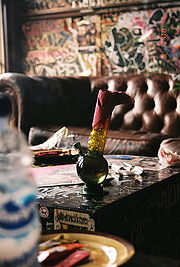
Smoking on the premises
Smoking jointsCannabis smoking
Cannabis smoking involves inhaling vapors released by heating the flowers and subtending leaves of the Cannabis plants, known as marijuana. Alternatively, the cannabis plant flowers may be finely sifted producing kief, a powder especially rich in the oil-glands or trichomes which contain the...
has been common in cannabis coffee shops. However, since 1 July 2008 there is a tobacco smoking ban in the Netherlands which allows smoking joints containing tobacco in a separate smoking room only. Bongs and pure cannabis joints can still be smoked inside the premises. However, most coffee shops still sell mixed joints/ spliffs, i.e. those with tobacco mixed with marijuana, and have made customers smoke in upstairs or downstairs rooms. In some shops, however, the separation room rule is only as 'separate' as the smoking/non-smoking 'separation' sections in many restaurants and bars around the world.
Canada
Despite Canadian lawsCannabis legalization in Canada
The legal status of cannabis in Canada is under dispute. Superior and appellate courts in Ontario have repeatedly declared Canada's marijuana laws to be of no force and effect. However, challenges to marijuana laws at the federal level have not resulted in the deletion of the appropriate articles...
forbidding its non-medical use, some cities and local law enforcement have, at times, tolerated coffee shops which allow customers to smoke cannabis.
In Vancouver
Vancouver
Vancouver is a coastal seaport city on the mainland of British Columbia, Canada. It is the hub of Greater Vancouver, which, with over 2.3 million residents, is the third most populous metropolitan area in the country,...
, for example, the New Amsterdam and Blunt Brothers were cafes on West Hastings Street with such pro-cannabis policies. The two companies have been at the core of Vancouver's "Vansterdam" scene since the beginning. In 2004 Blunt Bros Cafe & Headshop, along with four other businesses were destroyed by a fire that ripped through the 303 building on West Hastings street. The fire was ruled as arson, but no one was ever found or charged. The New Amsterdam Cafe narrowly avoided destruction by that very same fire and has since been the last bastion of the Vansterdam Vibe. The New Amsterdam Cafe is still open for business. In Vancouver, these shops can mostly be found on the block of 300 West Hastings Street.
In Toronto
Toronto
Toronto is the provincial capital of Ontario and the largest city in Canada. It is located in Southern Ontario on the northwestern shore of Lake Ontario. A relatively modern city, Toronto's history dates back to the late-18th century, when its land was first purchased by the British monarchy from...
, there are a growing number of bring-your-own-cannabis coffee shops, with The Hotbox Cafe and The Kindred Cafe being the most well known. Each Toronto cafe has its own set of rules.
Denmark
In DenmarkDenmark
Denmark is a Scandinavian country in Northern Europe. The countries of Denmark and Greenland, as well as the Faroe Islands, constitute the Kingdom of Denmark . It is the southernmost of the Nordic countries, southwest of Sweden and south of Norway, and bordered to the south by Germany. Denmark...
the coffeeshops of Freetown Christiania
Freetown Christiania
Not to be confused with Christiania, Norway, another name for Oslo.Christiania, also known as Freetown Christiania is a self-proclaimed autonomous neighbourhood of about 850 residents, covering 34 hectares in the borough of Christianshavn in the Danish capital Copenhagen...
were abolished the 16 March 2004, as part of the wider issues involved with Free Christiania.
United States
NORML has opened a cannabis-themed coffee shop in Portland, Oregon. It is accessible to NORML members who are authorized under The Oregon Medical Marijuana Program. Cannabis is not available for sale, but distributed freely for consumption on premises.External links
- CoffeeshopNieuws.nl All the latest news about the Dutch tolerance policy and cannabis coffeeshops.

